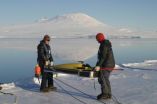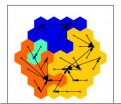Do birth control pills cause weight gain? New research says no
2011-01-20
(Press-News.org) PORTLAND, Ore. – According to research conducted at the Oregon National Primate Research Center at Oregon Health & Science University, the commonly held belief that oral contraceptives cause weight gain appears to be false. The results of the study are published online and will appear in next month's edition of the journal Human Reproduction.
"A simple Google search will reveal that contraceptives and the possibility that they may cause weight gain is a very highly debated topic," said Alison Edelman, M.D., a physician and researcher in the Department of Obstetrics and Gynecology at OHSU and lead author of the study.
"Issues surrounding weight are hard to study in humans, and the research thus far has been insufficient to demonstrate whether or not oral contraceptives cause weight gain or loss. But this is an extremely important question as concern about weight gain is one of the main reasons why women may avoid or discontinue birth control, which in turn places them at greater risk for an unplanned pregnancy."
To conduct their research, scientists and physicians studied a group of rhesus macaque monkeys at the OHSU Oregon National Primate Research Center for almost a year. Rhesus monkeys were used in this study because their reproductive system is nearly identical to humans. However, unlike human studies, more variables can be controlled and measured – such as exact food intake - to provide more meaningful data.
At the beginning of the study, half the animals were obese and half were normal weight. During the eight-month treatment period, animals received doses of oral contraceptives, adjusted to the weight of the animals so that it mimicked dosage in humans. Researchers tracked weight, food intake, activity levels, body fat and lean muscle mass. At the study's conclusion, the normal weight group remained weight stable whereas the obese group lost a significant amount of weight (8.5%) and percent of body fat (12%) due to an increase in basal metabolic rate. No changes were seen in food intake, activity or lean muscle mass for either group.
"This study suggests that worries about weight gain with pill use appear to be based more on fiction than on fact," said Judy Cameron, Ph.D., senior author of the paper and a researcher at the primate center.
"Additionally, there may be a differential affect depending on your starting weight – heavier individuals who keep their diet stable may see a weight loss with pill use. Most likely, the reason why this belief continues to exist is that the weight gain that seems to occur with age is being attributed to these medications. We realize that research in nonhuman primates cannot entirely dismiss the connection between contraceptives and weight gain in humans, but it strongly suggests that women should not be as worried as they previously were."
INFORMATION:
The research was funded by the Society for Family Planning.
About ONPRC
The ONPRC is a registered research institution, inspected regularly by the United States Department of Agriculture. It operates in compliance with the Animal Welfare Act and has an assurance of regulatory compliance on file with the National Institutes of Health. The ONPRC also participates in the voluntary accreditation program overseen by the Association for Assessment and Accreditation of Laboratory Animal Care International (AAALAC).
About OHSU
Oregon Health & Science University is the state's only health and research university, and only academic health center. As Portland's largest employer and the fourth largest in Oregon (excluding government), OHSU's size contributes to its ability to provide many services and community support activities not found anywhere else in the state. It serves more than 184,000 patients, and is a conduit for learning for more than 3,900 students and trainees. OHSU is the source of more than 200 community outreach programs that bring health and education services to each county in the state.
END
ELSE PRESS RELEASES FROM THIS DATE:
2011-01-20
With mortgage loan defaults on the rise yet again, two mortgage researchers are proposing a new type of mortgage contract that automatically resets the balance and the monthly payment based on the mortgaged home's market value.
Brent Ambrose, Smeal Professor of Real Estate and director of the Institute for Real Estate Studies at the Penn State Smeal College of Business, and Richard Buttimer, a professor in the Belk College of Business at the University of North Carolina at Charlotte, call their new mortgage contract the "adjustable balance mortgage" and contend that it ...
2011-01-20
Researcher Walker Smith of the Virginia Institute of Marine Science, College of William and Mary, has been conducting shipboard studies of biological productivity in Antarctica's Ross Sea for the last three decades. This year he's letting underwater robots do some of the work.
Smith and graduate student Xiao Liu are using a two-year grant from the National Science Foundation to deploy and test a free-swimming underwater glider in the frigid waters of the Ross Sea near the U.S. McMurdo Research Station. The grant also funds efforts by fellow VIMS professor Marjorie Friedrichs ...
2011-01-20
Grand Rapids, Mich. (January 19, 2011) – In a collaborative project involving scientists from three continents, researchers have identified a gene that is mutated in one in three patients with the most common form of renal cancer. The gene – called PBRM1 – was found to be mutated in 88 cases out of 257 clear cell renal cell carcinomas (ccRCC) analysed, making it the most prevalent to be identified in renal cancer in 20 years.
The identification of a frequently mutated gene provides new insights into the biology of the disease, which will be critical in the continued effort ...
2011-01-20
The instability of large, complex societies is a predictable phenomenon, according to a new mathematical model that explores the emergence of early human societies via warfare. Capturing hundreds of years of human history, the model reveals the dynamical nature of societies, which can be difficult to uncover in archaeological data.
The research, led Sergey Gavrilets, associate director for scientific activities at the National Institute for Mathematical and Biological Synthesis and a professor at the University of Tennessee-Knoxville, is published in the first issue of ...
2011-01-20
Chapel Hill, NC – The National Cancer Institute estimates that more than 43,000 Americans were diagnosed with pancreatic cancer last year and more than 36,000 died from the disease. Despite advances in genetic science showing that the Ras oncogene is mutated in virtually all pancreatic cancers, scientists have been frustrated by the complexity of the signaling pathways in humans, which make it difficult to pinpoint potential therapeutic targets.
In a study published today in the Cell Press journal Developmental Cell, a team of researchers led by Channing Der, PhD, Distinguished ...
2011-01-20
LIVERMORE, Calif. – Using seawater and calcium to remove carbon dioxide (CO2) in a natural gas power plant's flue stream, and then pumping the resulting calcium bicarbonate in the sea, could be beneficial to the oceans' marine life.
Greg Rau, senior scientist with the Institute of Marine Sciences at UC Santa Cruz and who also works in the Carbon Management Program at Lawrence Livermore National Laboratory, conducted a series of lab-scale experiments to find out if a seawater/mineral carbonate (limestone) gas scrubber would remove enough CO2 to be effective, and whether ...
2011-01-20
Washington, DC — Recent legislative and regulatory actions make great strides toward establishing much needed incentives for pharmaceutical companies and others to develop and test more medications for pediatric rare diseases, including pediatric cancers, according to commentary by experts from Children's National Medical Center. The commentary appears in the January 19 issue of Science Translational Medicine.
"Pediatricians who treat children with serious and life-threatening diseases often find themselves face to face with the inadequacies of pediatric drug development," ...
2011-01-20
Ebola, a virus that causes deadly hemorrhagic fever in humans, has no known cure or vaccine. But a new study by University of Illinois at Chicago scientists has uncovered a family of small molecules which appear to bind to the virus's outer protein coat and may inhibit its entry into human cells.
The results are to be published in the Journal of Medicinal Chemistry and are now online.
Previous studies have shown that small molecules can interfere with the Ebola infection process, says Duncan Wardrop, associate professor of chemistry at UIC and corresponding author of ...
2011-01-20
Some amoebae do what many people do. Before they travel, they pack a lunch.
In results of a study reported today in the journal Nature, evolutionary biologists Joan Strassmann and David Queller of Rice University show that long-studied social amoebae Dictyostellum discoideum (commonly known as slime molds) increase their odds of survival through a rudimentary form of agriculture.
Research by lead author Debra Brock, a graduate student at Rice, found that some amoebae sequester their food--particular strains of bacteria--for later use.
"We now know that primitively ...
2011-01-20
An increased interest in biofuel production and a growing need to find cost-effective livestock feedstuff alternatives has led University of Illinois researchers to further evaluate the use of glycerin in swine diets.
This study, led by U of I graduate research assistant Omarh Mendoza, was published in the Journal of Animal Science and reports that swine diets may include up to 15 percent glycerin and achieve similar performance to a conventional corn:soybean diet.
"Glycerin is not a new product, but little is known about its role as a feed ingredient for swine," ...
LAST 30 PRESS RELEASES:
[Press-News.org] Do birth control pills cause weight gain? New research says no



